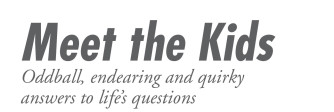

Sixth-graders at Denver Discovery left to right: Jenna Kwong, Blake Underwood, Ryan Hilty, Max Ramirez and Ayla Perez.
The Internet is an extremely powerful force. It has the power to educate, collaborate and organize. At the same time, the Internet invites obscenity and hatred, and is a cesspool of bullying. How can the Internet remain a positive force?
A group of sixth-graders from Denver Discovery met to discuss this topic. As 11- and 12-year-olds, Jenna Kwong, Blake Underwood, Ryan Hilty, Max Ramirez and Ayla Perez have had digital upbringings and they believe there should be more surveillance and censorship over the Internet.
This thinking is surprising. Most people have fiercely resisted control over the Internet in fear of losing their First Amendment right of freedom of speech. Obvious examples like China or Russia where there is very little Internet freedom make the hair stand up on the back of Americans’ necks. But the sixth-graders swung the other direction.
“Things like cyberbullying and harassment, that’s really only an American thing and I think it’s good for companies to take down those types of pages because if America doesn’t do something about it, it’s only going to get worse,” Max Ramirez said.
“I think sometimes Americans have too much freedom on the Internet and people post a lot of bad stuff,” Ayla Perez added.
All of them have witnessed offensive or inappropriate photos, comments and conduct on the Internet.
Someone in our school, I don’t want to say who, created a hate page for someone.
I saw some violent and sad posts by people on Instagram so I deleted my account.
I’ve seen people comment, “You’re ugly” when someone posts a selfie.
Because there is no facial expression or voice inflection on the Internet, it is difficult to tell what is funny and what is offensive. The students admitted to having offended friends over the Internet in the past and regret some of the things they’ve said.
“People can become very depressed about themselves on the Internet,” Ryan Hilty said. This is the reason his parents have not allowed him to get the photo-sharing app Instagram. “I think most of us here realize there are cyberbullying norms that you should follow, like the golden rule to treat people the way you want to be treated. But, really anything goes on the Internet.”
This year they studied Internet freedom in their social studies class and were each assigned a country to study its Internet freedom laws. They found countries like China and Russia are too strict, but some countries are doing it better than the U.S.
“I personally studied Canada and I think they’ve got it down. The U.S. just allows everything. In Canada you can use everything but some things are blocked (like how to look up a bomb) or there are things you can’t say,” Blake Underwood said.
Most applications and websites’ terms of use state the user may not post anything offensive. For example, Instagram does not allow “violent, nude, partially nude, discriminatory, unlawful, infringing, hateful, pornographic or sexually suggestive photos or other content via the Service.”
At the same time, Instagram and other sites do not take responsibility for the content to avoid liability. Users own their content. The sixth-graders believe it is wrong for companies to not take ownership.
First, they agreed there should be strict repercussions for people who abuse terms of use. They have all seen photos that fall under Instagram’s criteria for inappropriate material. If a person posts something offensive, they should be kicked off and not allowed to create another account, which means phones would need to be tracked so a person cannot create another account from the same phone.
To avoid nasty or hurtful comments, Max Ramirez proposed the warning, “Are you sure you want to say this?” should pop up when a person is about to post. “Sometimes people are just mad and click and post, but if the computer questions you, it makes your brain think, ‘Oh, should I do this? Will people understand it the wrong way?’” he said.
In the end, the sixth-graders came to the consensus that controlling the Internet is an infinite task, but taking that extra second to ask, “Should I do this?” can make a difference. Change can begin with the day-to-day online interactions. “Think before you post,” they said. Even that much could make a more positive climate online.


0 Comments